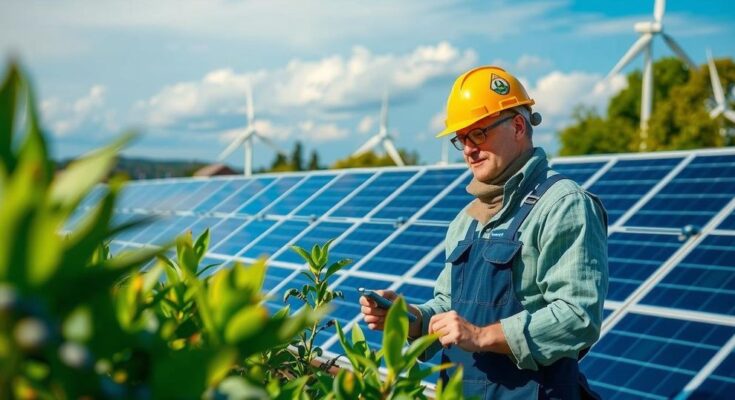The article discusses the clean energy revolution in the U.S., emphasizing the job creation stemming from the Inflation Reduction Act under President Biden. It highlights bipartisan interest in these jobs despite political divisions on climate change and underscores California’s influential role in promoting electric vehicles and renewable energy.
The transition to clean energy is an undeniable movement in the United States, one that many claim cannot be reversed. President Joe Biden emphasized this during a recent visit to Brazil. His administration has allocated $400 billion through the Inflation Reduction Act for innovative renewable energy technologies, such as solar power and electric vehicles, aiming to significantly reduce carbon emissions and combat climate change. Despite former President Donald Trump’s dismissal of climate change as a hoax, the jobs generated from the IRA are notable, with a majority in Republican-led states. Contrary to the reluctance of some Republican representatives, many within their ranks have acknowledged the value of the jobs created and oppose the repeal of the IRA, finding merit in its provisions, particularly those that bolster their own interests.
Global leaders recognize climate changes as a dual threat, posing ramifications not only for the environment but also for national security. Rising sea levels and increasingly severe weather have devastating consequences for infrastructure and ecosystems globally, necessitating a collaborative response to mitigate such challenges. The United States has upheld its commitment under Biden to intensify international climate financing significantly.
In this climate landscape, the state of California emerges as an influential player, demonstrating leadership and dedication to environmental issues. Governor Gavin Newsom’s stance on supporting electric vehicles reflects California’s significant market share in the EV sector and aims to encourage competition in the industry, especially amidst Tesla’s prevailing market dominance. Meanwhile, Trump’s ambitions to exploit the Arctic for oil drilling face skepticism regarding the feasibility and interest of major oil companies. The challenges of transitioning from fossil fuels to renewable sources may be met with some resistance, but significant legislative measures have mobilized approximately $1 trillion toward sustainable energy technology advancements in the U.S., demonstrating a clear path toward a cleaner energy future.
Despite the opposition, America is progressing towards an energy transition that cannot be impeded. Those hesitant to embrace this shift will likely find themselves overshadowed by an eager workforce ready to seize the opportunities that arise from this energy revolution.
The clean energy revolution in the United States represents a shift towards renewable energy sources, primarily driven by significant legislative support under President Biden’s administration, particularly through the Inflation Reduction Act. This act encompasses substantial investments aimed at developing sustainable technologies to combat climate change and its associated challenges. Concurrently, it has resulted in job creation, particularly in states that are traditionally aligned with Republican views. This article reflects on contrasting political stances regarding climate change and the ensuing economic implications.
In summary, the transition to clean energy is a formidable movement in the United States, supported by generous government investment under the current administration. While there is political contention regarding the reality and urgency of climate change, the resulting job creation and technological advancements indicate a positive shift toward sustainability. California’s leadership in this regard exemplifies the proactive measures being adopted at the state level, reinforcing the inevitable march towards a greener future that former President Trump and his allies cannot hinder.
Original Source: www.creators.com




